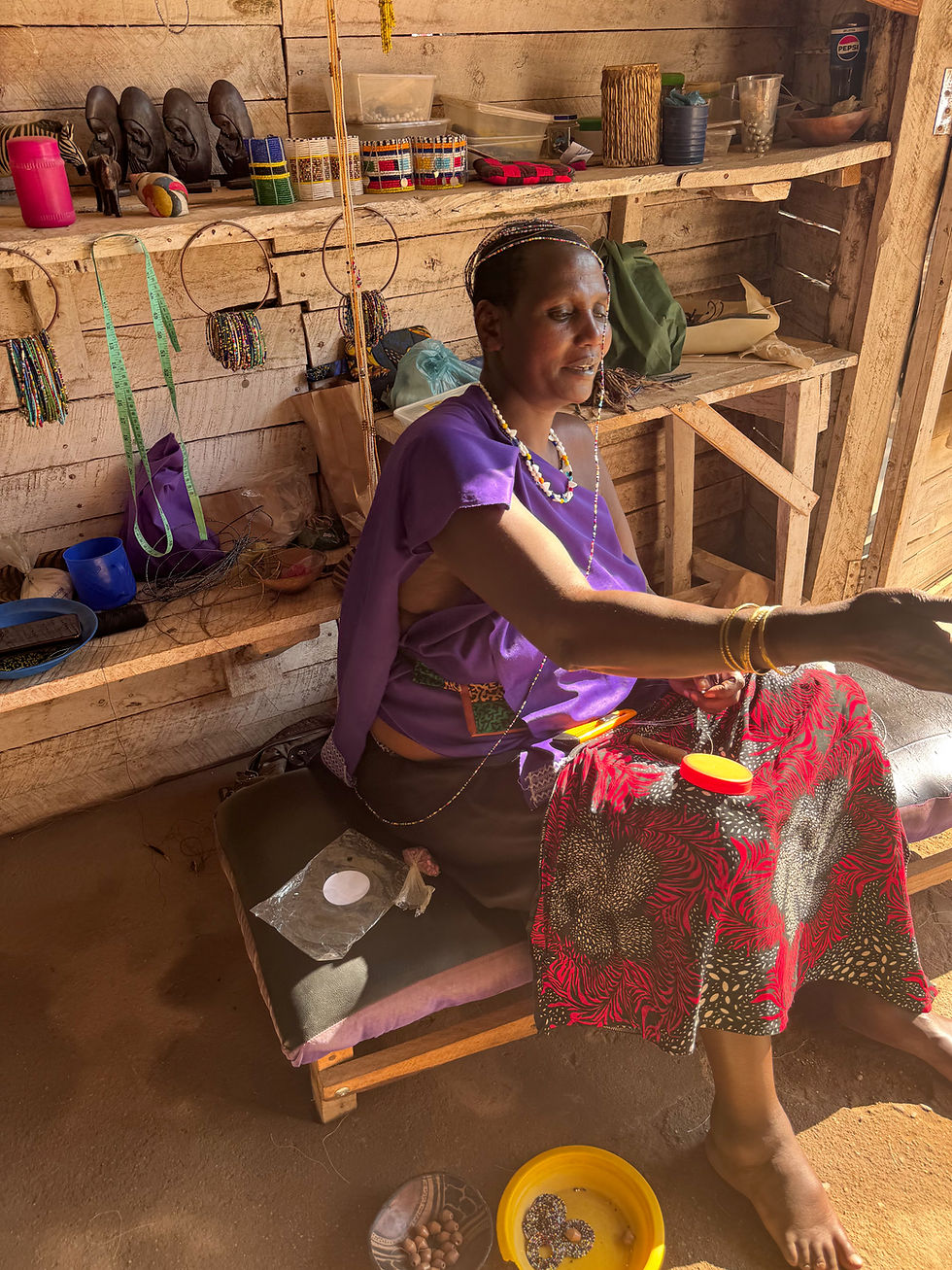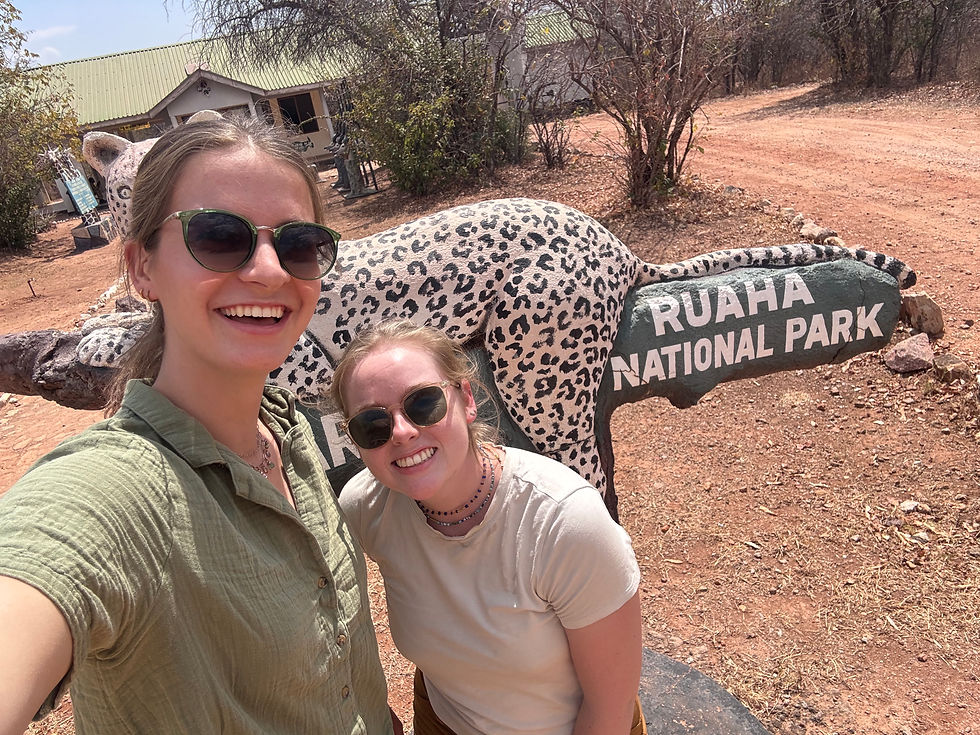Week 4
- Lucy P-BARG
- Jul 8, 2025
- 5 min read
Updated: Jan 9
Research Reflection: Treat Your Patients, Not Your Lab Results
This week in Iringa was marked by the new arrival of Chief Dennis, a sharp and methodical neurologist whose questions cut deeper than the clinical data presented. His presence changed the rhythm of ward rounds. We weren’t just reviewing vitals or lab values, we were questioning diagnoses. “How do you classify CKD? What’s the stage? What’s the underlying cause?” His style was intense, but it pushed everyone to think beyond routine medicine. Under his leadership, clinical uncertainty became an invitation to investigate more deeply, not an excuse to guess.
One of the most striking cases was that of Janes, a 30-year-old woman with AIDS, presenting with disorientation, tremors, and blood stained vomiting. Her case became an impromptu neurology lesson on TB meningitis, intracranial pressure, and differential diagnoses for focal deficits. A woman was seen praying heavily over her, underscoring how spiritual responses often accompany medical uncertainty. Moments like that combine medicine and faith, leading to an experience shaped by both culture and science. Sylvia, who had previously lingered in the ICU with no clear diagnosis, was referred out for further autoimmune testing, which was an encouraging decision since limited resources often delay such referrals. These clinical moments were paired with emotionally heavy conversations about what it means to care for people near the end of their lives.
Through an interview with Dr. Emmanuel, a young intern from Kilimanjaro, I gained insight into the Tanzanian perspective on pain, suffering, and death. For Emmanuel, pain is not just a symptom, it’s a signal that demands response, regardless of whether the patient is curable. He explained that every hospitalized patient has a right to be free of pain. Yet poverty and cultural stigma often prevent people from accessing care until it’s too late. He was adamant that dying in a hospital, where one has access to both physical and spiritual support, is far better than dying at home in pain. But he also acknowledged the emotional burden of watching families request discharge when they can't afford continued care. His reaction was raw: “I feel so bad… it’s not right and fair for the patient.”
Our rounds highlighted the tension between curative medicine and comfort care. I asked Rachel about transitioning focus from treatment to quality of life when solutions seemed out of reach. Her sharp reply: “Do you want us to kill them?”, revealed how palliative care is still a deeply stigmatized, misunderstood concept here. Emmanuel later clarified that their philosophy is to treat the problem as long as it exists: if you see infection, treat infection; if there is pain, relieve it. The emphasis is always on action.
This week reminded me that global health is not about tidy interventions. It’s messy, emotionally complex, and constantly shifting. I am learning not just to listen to patients, but to read between the lines, to see what their pain, silence, or discharge requests might actually mean. Clinical care here isn’t just about diagnosis or medication; it’s about making dignity possible in systems that are often stacked against it. What I carry forward is not just medical knowledge, but a deeper appreciation for context. As Emmanuel said, a “good death” happens when patients are treated for their pain, surrounded by family, and spiritually at peace. In other words, when they’re seen as full human beings, not just symptoms in a bed.
1) Kate and I waiting patiently to be able to interview some of the doctors after they finish up rounds 2) Male ward maintenance being completed on top of patients 3) Dr. Rachel and Shangazi reading an EKG 4) Rachel asked for a photo with Kate and I 5) Me sitting in the empty ICU, which is a good thing because that means nobody is critical :) 6) Our newfound interview spot next to the laundry 7) Lovely photo of the wards looking crisp and clean
Cultural Reflection: Shared Tables, Shared Hearts
This week, the moments that moved me most didn’t come from dramatic events or big realizations, but rather small acts of care that spoke volumes about the kind of community that we've been welcomed to. Every evening at the hostel, we gather around the dinner table with the other locals who live or work nearby. Kate and I have had the pleasure of befriending Devota and Josephina, two of the women who are responsible for running the day to day operations at the hostel. Devota has a dry, mischievous sense of humor and always keeps us on our toes, while Josephina feels like a gentle older sister, patient with our Swahili and eager to share pieces of her world with us. We talk with them for hours and have a comfort with them that doesn't require perfect translation.
Next Saturday, Josephina is taking us to the market to pick out fresh ingredients, and then we’ll learn how to cook a meal together. It feels like being let into a part of her life, her rhythm. We’re excited to learn and laugh together and probably make loads of mistakes, because being welcomed to engage everywhere and with everyone is one of those things that makes this place feel like home.
But this week also came with a reminder of how deeply people care for one another here. One of our close friends, who knows the hostel owner, had a terrible accident at his home, a post fell on him, and he broke his femur, collarbone, and hand. He’s being transferred to a larger hospital in Dar for surgery. When it happened, everything around us shifted. People dropped what they were doing to visit him, bring food, and pray by his bedside. That night, Kate and I got home after dinner, and the house that’s usually full of laughter, and people coming and going was silent. Everyone had gone to the hospital to support him. It wasn’t just concern, it was presence. Real, tangible compassion that didn’t wait to be asked. No hesitation and no expectation. Love, shown in the most practical and human ways.
I’m learning that in this community, care doesn’t need to be organized or professional. It lives in each person everyday, in sharing food, in holding space, in showing up. And whether it’s a walk to the market, a seat at the dinner table, or a visit to a friend in need, there’s an unspoken truth here: we don’t go through things alone. It’s easy to romanticize hospitality, but this isn’t performative. It’s real.
1) Kate and I with our friend Josephina, one of the women who runs the hostel 2) Tito and I have wonderful conversations every morning in Kiswahili, he is an amazing teacher 3) On 7/7, there is a farmers and workers holiday, so Kate and I had off of work which meant some eyebrow grooming in the morning! 4) One day on our way home from the hospital we had a bajaj with 8 people 5) Movie night at the hostel with Devota and Josephina 6) Every Friday Kate and I eat chocolate cake at the cafe, and we have been learning so many card games to pass the time waiting for meals 7) Funny photoshoot with Devota and Kate 8) Coffin delivery to the hospital 9) Timo's sweatshirt that we love, so philosophical



































Comments